高职国际英语Book1_Unit1
高职国际英语第1册unit1

China India it is join the hands with palms together and smile. In Japan usual bow from the waist and lower the eyes. the West to shake hands and smile. parts of Asia
Book 1
Book Rally
Directions: Skim through the book and find the answers to these questions.
1. What team sport can you see in unit 5?
B_a_s_k_e_tb_a_l_l,_p_a_ge__6_6_. _________________________
_W_i_n_g_K_e_i W__o_n_g_. ____________________________
7. What is the name of the girl who was bullied to death?
P_h_o_e_b_e_P_r_in_c_e_,_p_a_g_e_7_7_, _u_n_it_5_._________________
Two Chinese men
is
Two Japanese women are
Two Americans
bowing from the waist. joining her palms together and smiling. shaking hands and smiling.
Book 1 Unit 1 - People Focus
高职国际英语Book1_Unit1

Book 1
10. Where can you see a graph showing different entertainment media? Page 69, unit 5. ________________________________________ 11. Where is eBay’s head office? San Jose, On page 43, unit 3. ________________________________________ 12. Where can you find a picture of eggs? On page 99, unit 7. ________________________________________
Skills
Greeting people for the first time Introducing yourself and others
Saying hello and goodbye
Spelling out names Saying where you’re from
Writing: Filling out forms with personal
Unit 1 - People
People and issues – Text (A)Text study
Background information Words and expressions
Text
Looking at the text
Working with words Speaking
Listening
two Americans? Which picture shows
two Chinese men?
高职国际英语book1Unit

Lesson 1Unit 3. Shopping1. This unit is about…Topics:➢Kinds of retail outlets➢ How supermarkets make shoppers buy➢ The first supermarket➢ Chinese clothing size converter➢ Traditional shopping vs. online shopping➢ eBaySkills:Talking about shopping and shopping habits ➢Speaking: Role-play: Shopping scenesGiving a personal opinion about Internet use ➢Writing: Comparing mail-order shopping and Internet shoppingA guided summaryProject: A shopping guide for your neighborhood Grammar:➢Adjectives: Comparison of adjectivesShopping Habits➢How often do your family shop?➢Where do you usually go shopping?Useful Expressions➢weekly; daily➢ occasionally during the week➢ department stores; online retailers2. FocusWork with a partner.2.1 Label the photos with an expression from the box.1. supermarket2. market3. corner shop4.street vendor5. specialist store6. onlineretailer (chemist’s)7. department store 8. chain store 9. shopping mall➢chain store corner shop department store➢market online retailer shopping mall➢specialist store (chemist’s) street vendor supermarket2.2 Where do you do your shopping?2.3Talk about your shopping habits.Useful Expressions➢I often/sometimes/never do my shopping/shop at a/an department store/ …➢My partner/He/She/(sb.’ name) does his/her shopping/ … at a/an …3. Text Study (Passage A)3.1 Background Informationonline shopping✧online retailing, the act of purchasing products orservices over the InternetKey words:physical storesonline storesconvenientbargainholiday seasonwait in long linesconsumerism✧ a belief that encourages the purchase of goods andservices in ever-greater amounts✧Key words:✧consumerist✧movement✧ a set of policies✧regulate✧standard✧manufacturers✧in the interests ofimpulse purchase✧impulse buying, an unplanned decision to buy a productor service, made just before a purchase✧Key words:✧impulse purchaser✧impulse buyer✧financial difficulty✧family disapproval✧feeling of guilt✧disappointment✧3.2 Words and Expressionsexpert n. 专家trolley n. 手推车purchase n.购置物shopping list 购物单pepper n.辣椒sorted adj. properly arranged or planned 分选的pre-packed adj. already packed 预先包装的special offer bargain 特价商品packet n.小包,小袋bakery n.面包烘房roll n.小圆面包display n.展列canned adj.罐装的bottled adj.瓶装的frozen adj.冷冻的goods n.货品delicatessen n.熟食店freshness n.新鲜食品electrical adj.电气的product n.商品essential n.必需品butter n.黄油impulse item 一时冲动购买的商品profit n.利润brand name 品牌processed food 加工食品pre-cooked meal 半成品食品profitable adj. money-making 盈利的at eye level 齐眼的高度checkout n.收银台leaflet n.传单loan n.贷款insurance n.保险mobile phone 移动电话credit card 信用卡3.3 Text译文被动消费步入大型超市时,千万不能大意!那帮精明狡诈的人已经看到了你的到来。
高职国际英语教学案book1Unit
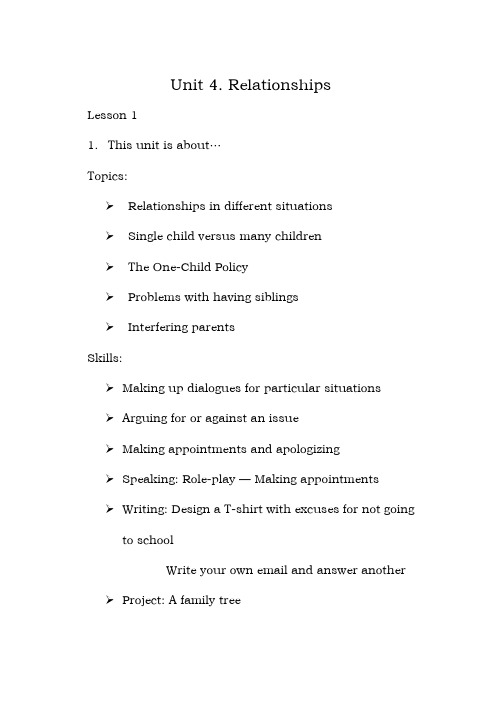
Unit 4. RelationshipsLesson 11. This unit is about…Topics:➢Relationships in different situations➢Single child versus many children➢The One-Child Policy➢Problems with having siblings➢Interfering parentsSkills:➢Making up dialogues for particular situations➢Arguing for or against an issue➢Making appointments and apologizing➢Speaking: Role-play — Making appointments➢Writing: Design a T-shirt with excuses for not going to schoolWrite your own email and answer another ➢Project: A family treeTop excuses for not going to the dentist’s Grammar:➢Adverbs:Comparison of adverbs2. Focus2.1 Match dialogues a–f to the situations 1–6.First, take a look at all the 6 situations.a. A: Why do we always have to watch what my brotherand sister want to?B: Because you chose yesterday and now it is somebody else’s turn.b.A: Is this your first time here?B: No, I am a regular customer. I come every six weeks.But I had to postpone my last appointment because my sister was ill.c. A: Where were you yesterday, Brian?B: I’m sorry that I couldn’t come to school but I was ill and had to stay in bed.d. A: Why did you cancel that dentist’s appointment? B: Because I hate dentists. And I thought my toothache would go away.e. A: Why do you always make dentist’s appointments for me?B: Because you never have time; when you make an appointment you forget to go.f. A: What is the problem with being an only child?B: You never have anybody to talk to or share your problems with.2.3 Now create dialogues for these three situations:1. Your friend has just cancelled a visit to the cinemawith you (for the second time!).Example:A: Why have you cancelled our visit to the cinema again? B: I’m sorry. I forgot that I had to go to m y grandmother’s tonight.A: But that is what you always say when you do not want to dosomething with me.B: That’s not true. I only say that when I want to cancel a visit to thecinema.2. Your grandfather has just told you he will give you the money for driving lessons. However, he says that you will have to drive him to the doctor’s once a week. Example:A: Okay, I will give you the money for driving lessons butyou willhave to drive me to the doctor’s once a week.B: That’s okay. But I can’t go on Mondays, Wednesdays, Thursdaysand Fridays.A: And what is the problem on those days?B: In the mornings I have school and in the afternoons I have apart-time job in a supermarket.3. You are complaining in a shop that your MP3 player that you bought last week does not record. Unfortunately you have lost the receipt.Example:A: I bought this MP3 player last week and it doesn’t record.B: Can you show me your receipt, please?A: I seem to have lost my receipt.B: I’m very sorry b ut we cannot help you unless youshow us thereceipt.3. Text Study (Passage A)3.1 Background InformationOne-Child PolicyOfficially the Family Planning Policy, it is the population control policy of the People’s Republic of China.Key words:•population growth rate•ethnic minorities•rural families•exception•siblings•an only childexempt fromNow, since the One-Child Policy was introduced, people have been able to and required to save money moreeasily.:After the One-Child Policy was issued and implemented, gradually people found that they could save up some money much more easily than before. At the same time, people also found that they had to save more money for their unknown future because of the One-Child Policy.3.2Words and Expressionscampaign n. 运动One-Child Policy 独生子女政策delegate n. 代表do away with remove 废除sibling n. 兄弟(或姊妹)give birth to have a baby 生孩子octuplets n. 八胞胎3.3TextDifferent countries, different families — but which is better?3.3.1Explanation of important words in details1.campaign n. a systematic course of aggressive activities for some specific purpose (社会、政治)运动,活动e.g. T he candidate kicked off his campaign with a speech on t elevision.该候选人由电视演讲开始了他的竞选活动。
高职英语第一册unit 1

Unit OneWhy College?ⅠWarm-Up Activities1. Listening: (Listen to the summary of the text made by you or news related to the text and then answer the following questions. In case of meeting some new words, write them down on the blackboard and give some brief hints.)2. Interview:3. Discussion: (It allows the students to work in pairs or small groups to discuss the following questions.)1) What’s the advantage of going to college?2) What’s the disadvantage of finding a job after high school?3) Give your opinions.4. Report:Look at the title.Why college?Do you know what college is?Well you are college students. Well if someone ask you, what’s your major? How to answer? You should say I’m Sports majors. Sports majorDegreeBachelor degreeMaster degreeWhy you come to college?For a better life, right?Diploma 文凭After you graduate from school you will start your career.Entertainer 演艺人员Entrepreneur 企业家Executive 管理人员Athlete 运动员ⅡVocabulary StudyRead and explain some useful words or phrases.o advanced:e.g. Most people find her advanced ideas difficult to accept.o beyond: outside the range ofe.g. The car is beyond repair.------ Can you give me a hand?_____ Sorry, it is beyond me.o dominate: v. have power and control overe.g. Much of my spare time seems to be dominated by housework.Sports, and not learning, seem to dominate at that school.o entertainer:eraser, erector, director, computer, weedier, viewer, and so on.o faith: (in)e.g. Have you any faith in what he says?o major: n. chief subject at collegee.g. Business English is my major at college.adj. chief or importante.g. Guangzhou is one of the major cities of China.v. specialize ine.g. He majored in two subjects at CambridgeUniversity.o outearn: v. earn more thane.g. Tom outearns his father.out: surpassinge.g. outgo, outgrow, outlook, outliveo view:v. see or regard or think ofe.g. We will go and view the house before we buy it. ( inspect)He was viewed as the best candidate for this fob. (think of sb. as)II. Text Presentation and Language Points1. The more you learn, the more you earn.This is a structure used to show that two things happen together.Examples:A. The more practice you have, the fewer mistakes you will make.B. We'll have to begin our journey early tomorrow; in fact, the earlier, the better.C. Actually, the busier he is, the happier he feels.D. The more I read the poem, the more I understood it.2 .... as she accepted her high school diploma.diploma: a certificate of graduation from a school or collegeExamples:A. He received a diploma from Harvard in 1978.B. She worked hard to earn her music diploma.3. Although Cyndi made it without a high school degree, most people don't.make it: be successful (in one's career, etc.)Examples:A. He failed to make it as a writer.B. It's hard to make it to the top in show business.4. In the U.S.A. today, about 75% of jobs require some education or technical training beyond high school degrees; college graduates outearn those without a college education;...1) require: needExamples:A. What do you require of me?B. They required me to be quiet.C. It is required that the instrument should be tested before it is actually used.2) beyond: outside the range ofExamples:A. The car is beyond repair.B. Your work is beyond all praise.C. They're paying $100,000 for a small flat it's beyond belief.3) outearn: earn more thanExample:Tom outearns his father.4) out-: to a greater extent; surpassing, such as outdo, outlive, outnumberExamples:A. Jim outlived his wife by five years.B. John was unable to outdo his elder brother at tennis.C. The teenager outgrew his shoes in four months.D. Our army outnumbered the enemy's troops.5. Many skilled blue-collar workers, salespeople, business executives, and entrepreneurs outearn college professors and scientific researchers.executive: person or group in a business organization with administrative or managerial powers Example:I would like to apply for the position of sales executive.Lines 13 176. But a college education is not only preparation for a career; it is also (or should be) preparation for life.career: job or professionExamples:A. People choose their careers for many reasons.B. A r6sum6 always includes a description of your career objectives.7. In addition to courses in their major field of study, most students have time to take elective courses.1) in addition to: as well as; besidesExamples:A. In addition to giving a general introduction to computers, the course also provides practical training.B. We saw a Mickey Mouse cartoon, in addition to the cowboy movie.2) major as an adjective: greater or more importantExample:A. Cigarette smoking is a major factor contributing to cancer.B. Chicago is one of the major cities of the United States.major as a noun: a chief or special subject at a universityExample:She chose economics as her major.major in: specialize in (a certain subject) at college or universityExample:Helen majored in two subjects at the University of Maryland.8 .... or whatever else interests them.whatever: (used as pronoun or adjective)Examples:A. Whatever happens, don't forget to write to me.B. You can take whatever book you like on the bookshelf.9. But recent high school graduates no longer dominate the college campuses.1) graduate as a noun: person who has completed a course at a college, school, etc.Example:College graduates in China are now-ready to accept lower-paid jobs.graduate as a verb: complete an educational courseExample:He graduated from Oxford ten years ago.2) dominate: have power and control overExamples:A. He completely dominated the group and made all the decisions.B. Thanks to his strong personality, John dominated the new committee.3) campus: the grounds of a school, college or universityExamples:A. Freshmen are required to live on campus.B. The Princeton campus has developed into one of the most attractive in the country.10. Serving this great variety of people are about 3,400 colleges and universities enrolling more than 12 million students.variety: different kinds ofExamples:A. The electronics department had a wide variety of radios.B. There is quite a variety of food on the buffet table.11. American faith in the value of education is shown by this rising number of Americans who have at least a bachelor's degree.faith: strong belief inExamples:A. Have you any faith in what he says?B. I haven't much faith in the medicine.12. In the U.S.A., a college education is not viewed as a privilege reserved for the wealthy or the academically talented.1) view.., as: consider sb. or sth. in a certain wayExamples:A. I view John as a reliable colleague.B. John views his office as a dungeon.2) ) privilege: special fight given to a personExamples:A. The wealthy seem to have a great many privileges.B. Diplomats enjoy a lot of privileges in foreign countries.3) reserve: keep for a special purpose; make a reservation; and reserved is often used as adjective, meaning unwilling to express oneself freely or kept for special use.Examples:A. We'll reserve the room for you till noon tomorrow.B. The first three rows of the hall are reserved for special guests.C. I have reserved a table for two at the restaurant.D. Sorry, we haven't a reserved table.E. Jane is a shy, reserved girl.4) talent: special natural ability or skill; and talented is adjectiveExamples:A. He has a talent for drawing.B. This university aims at helping young people develop their talents.C. Yao Ming'is a highly talented basketball player.talented: having or showing talent; giftedExample:He was a very talented architect.V. Summary of the TextBetter education usually means higher incomes, although this may not always be the casein our life. In America today, more and more people, in spite of their differences in age, go to college also for career advancement or personal growth. The fact that America has got amuch higher percentage of people with college degrees than most other major countries in the world is proof of American faith in the value of education and equal rights for education in theU.S.Word reviewLet’s have a review of what we have learned.ReviewThree fundamental sentence patterns1) be eg: I am a boy2) There be: Three are 70 students in our class.3)He studied English.He studied English hard in the university for the test on Sunday.He studied English on Sunday.He studied English in the University on Sunday.He studied English hard.He studied English for the test.OutearnTom outearned his father last year.GraduateHe graduates from Oxford ten years agoDominateJohn dominated the new committee, thanks to his strong personality.He completely dominated the group and made all the decision.ReserveWe’ll reserve the room for you till noon tomorrow.The first three rows are reserved for special guests.We reserved the first three rows for special guests.I have reserved a table for two at the restaurant.ReservedJane is a shy, reserved girl.RequireWhat do you require of me? Require sth of sbThey required me to be quiet. Require sb to do sthIt is required that the instrument should be tested before it is actually used.It is required that…Made itHe failed to make it as a writerIt’s hard to make it to the top in show business.In addition toIn addition to the cowboy movie, we saw a Mickey Mouse cartoon.View… asI view john as a reliable colleague.John views his office as heaven.3. Read the text again and answer my questionGrammarHomework英语冠词专项练习题:1. I read ______story. It is ______interesting story.A. a, anB. a, aC. the, theD. /, an2. Britain is __ European country and China is ___ Asian country.A. an, anB. a, aC. a, anD. an, a3. ______China is _____ old country with _____ long history.A. The, an, aB. The, a, aC. /, an, theD. /, an, a4. _____elephant is bigger than ______ horse.A. /, /B. an, aC. An, aD. /, the5. We always have ______rice for ______lunch.A. /, /B. the, /C. /, aD. the, the6. It took me ______ hour and _____ half to finish ______ work.A. a, a, aB. an, a, aC. an, a, theD. an, a, /7. ______ doctor told me to take ______ medicine three times______day, stay in _____bed, then I would be better soon.A. /, a, a, theB. A, the, the, /C. The, the, a, /D. A, /, a, /8. There is ____ picture on ____ wall. I like ____ picture very much.A. a, the, theB. a, the, aC. the, a, aD. a, an, the9. January is ______first month of the year.A. aB. /C. anD. the10. Shut _____door, please.A. aB. anC. theD./11. Einstein won _____ Nobel Prize in Physics in 1921.A. aB. anC. theD. /12. What ____ fine day it is today! Let's go to the Summer Palace.A. aB. anC. theD. /13. I like music, but I don't like ____ music of that TV play.A. aB. anC. theD. /14. ____ girl over there is ____ English teacher.A. The, anB. A, /C. The, /D. A, a15. It's ____ exciting way to shop on the Net.A. aB. anC. theD. /16. She was ___ founder of ___ order of nuns called the Missionaries of Charity.A. a, anB. a, /C. the, /D. the, an17. Xi'an is ___ old city with ___ long history, isn't it?A. a, anB. an, aC. the, theD. the, a18. Nancy's sister is ____ English teacher, isn't she?A. aB. anC. theD. /19. Chaffs is______ boy, but he can play the guitar very well.A. an eight-years oldB. a eight-year-oldC. a eight-years-oldD. an eight-year-old20. We often have sports after class, and I like to play _____ basketball.A. aB. anC. theD. /21.More college graduates would like to work in _______ west part of our country ______ next year.A. the, theB. /, /C. /, theD. the, /22.We work five days ______ week.A. aB. anC. theD. /23.-In which class is ______ boy in white?-He's in class 4.A. theB. aC. anD. /24.-Where do you usually have ______ lunch?-At home.A. aB. anC. theD. /25.He hit his sister in ______ face.A. theB. herC. ×D. his26.-Have you seen ______ book? I left it here this morning.-Is it ______ Chinese book? I saw it.A. a, theB. the, theC. the, aD. a, a27.There's ______“u” and ______“s” in ______word “use”.A. an, a, theB. a, an, ×C. a, a, aD. a, an, the28.-Did you see my grandmother?-Oh, I saw ______old woman sitting on a chair by the lake. Maybe she is.A. aB. anC. theD. ×29.-Do you see ______man with dog?-Oh, Yes, dog is yellow.A. the, a, TheB. a, a, theC. a, a, AD. a, the, A30.Who is ______better, Li Ping or Wang Dong?A. theB. aC. anD. ×参考答案:1-5 ACDCA 5-10 CCADC 10-15 CACAB 16-20 DBBDD 21- 25 DAADA 26-30 DDBBD。
高职国际进阶英语综合教程1 unit1课文原文和译文

高职国际进阶英语综合教程1 unit1课文原文和译文Text AYou are hereRead the text and find out why Max went the wrong way.It was easy for Max to get to Liverpool Station. He enjoyed the 300-mile train journey through the countryside, but now came the difficult bit. How could he find the youth hostel? The guidebook said it was in an old warehouse down by the docks. The address was Tabley Street with the postcode L18EE.He asked at the tourist information office opposite the station. The woman behind the counter gave him a map of the city and said it was only a 10-minute walk. He could see the station on the map and River Mersey with the docks. It looked easy enough to find. He started to walk, but then it began to rain.After half an hour he decided to ask somebody for directions. He stopped a man in the street.“Excuse me, can you tell me the way to the youth hostel?”But the man answered, “Sorry, I’m a stranger here myself.”He then asked a policeman, “Excuse me, do you know where the youth hostel is?”“Well, the easiest way is if you go to the station. It is only a 10-minute walk from there. Ah, you have a map. Let’s see. We are here. The railway station is there on the corner of Station Road and Main Street. Go straight down Station Road past the cinema. Then you will come to a crossing with traffic lights. Turn left at the traffic lights and straight on at the roundabout. The youth hostel is in front of you. You really can’t miss it.”“Thanks a lot for your help.”“Don’t mention it,” said the policeman.Max looked at the map and realised that he had looked at it upside down. He hadn’t turned left at the traffic lights; he had turned right! And instead of going straight on at the roundabout, he had turned left.A very wet Max went back to the station and this time he was very careful not to take a wrong way. Five minutes later he was standing in front of the youth hostel.课文译文麦克斯轻而易举就到了利物浦车站。
职高英语基础模块1高等教育unit1教案
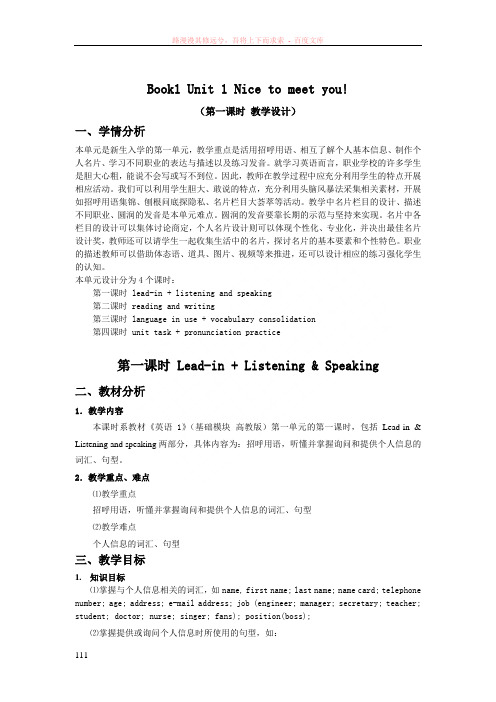
Book1 Unit 1 Nice to meet you!(第一课时教学设计)一、学情分析本单元是新生入学的第一单元,教学重点是活用招呼用语、相互了解个人基本信息、制作个人名片、学习不同职业的表达与描述以及练习发音。
就学习英语而言,职业学校的许多学生是胆大心粗,能说不会写或写不到位。
因此,教师在教学过程中应充分利用学生的特点开展相应活动。
我们可以利用学生胆大、敢说的特点,充分利用头脑风暴法采集相关素材,开展如招呼用语集锦、刨根问底探隐私、名片栏目大荟萃等活动。
教学中名片栏目的设计、描述不同职业、圆润的发音是本单元难点。
圆润的发音要靠长期的示范与坚持来实现。
名片中各栏目的设计可以集体讨论商定,个人名片设计则可以体现个性化、专业化,并决出最佳名片设计奖,教师还可以请学生一起收集生活中的名片,探讨名片的基本要素和个性特色。
职业的描述教师可以借助体态语、道具、图片、视频等来推进,还可以设计相应的练习强化学生的认知。
本单元设计分为4个课时:第一课时 lead-in + listening and speaking第二课时 reading and writing第三课时 language in use + vocabulary consolidation第四课时 unit task + pronunciation practice第一课时 Lead-in + Listening & Speaking二、教材分析1.教学内容本课时系教材《英语1》(基础模块高教版)第一单元的第一课时,包括Lead-in & Listening and speaking两部分,具体内容为:招呼用语,听懂并掌握询问和提供个人信息的词汇、句型。
2.教学重点、难点⑴教学重点招呼用语,听懂并掌握询问和提供个人信息的词汇、句型⑵教学难点个人信息的词汇、句型三、教学目标1.知识目标⑴掌握与个人信息相关的词汇,如name, first name; last name; name card; telephone number; age; address; e-mail address; job (engineer; manager; secretary; teacher; student; doctor; nurse; singer; fans); position(boss);⑵掌握提供或询问个人信息时所使用的句型,如:1) about greeting:Good morning.Hi.Nice to meet you.2) about personal informationWhat’s you name?Where are you from?Which company are you from?2.能力目标⑴学生能听懂关于询问和提供个人信息的对话。
(完整版)中职英语_book1_unit1-lesson1_第一单元

Situation 3
三. 老朋友打招呼 你和你的好朋友很 久没见了。见面后 亲热打招呼。 (long time no see)
Brief summary
Communicate Practice Sentence patterns New words
Homework
1. Make dialogues with a partner on greeting. 2. Do P1,P2 of Exercise Book.(学习指导与练习:
Let me introduce myself.
spell v. 拼写
你的名字如何拼写? How do you spell your name?
call v.命名,把…叫作 请叫我Mary好了。
Please call me Mary.
vocational
青岛商务学校
adj.
职业的
我在职业学校学习。 I study in a vocational school.
greet call secretary computer
introduce greet spell call vocational secretary boss computer
计算机 拼写 秘书 打招呼 老板 介绍 职业的 把…叫作
lacl
torniceud lepsl caootinalv
词汇联想) 3. Find a film or TV program that you can dub
(配音)with your partners.(选作题)
b. Yes,it is.
c. Morning
Situation 1
一.师生打招呼
A.你是一名新生,遇见 一位教师,跟她打招呼。 B.你是一位教师,一名 新生跟你打招呼,你也 跟她打招呼。
高职国际英语Book1-Unit1

_N_e_w_Y_o_r_k_. P_a_g_e_8_,_u_n_it__1.______________________
22. Who won the French Open in 2011?
Listening 1 Listening 2 Listening 3 Listening 4
Book 1 Unit 1 - People
Personal view – Text (B)
Text study
Background information Words and expressions Text
O__n_p_a_g_e_1_2_7_, _u_n_it_8_._________________________
19. Where can you find a form to fill out?
O__n_p_a_g_e_1_4_,_u_n_it_1_.__________________________
Book 1 Unit 1 - People
People and issues – Text (A)
Text study
Background information Words and expressions Text
Looking at the text Working with words Speaking Listening
P_h_o_e_b_e_P_r_i_nc_e_,_p_a_g_e_7_7_, _u_n_it_5_._________________
8. Where can you find a text about a dental appointment?
高职国际进阶英语综合教程unit1课文原文和译文

高职国际进阶英语综合教程unit1课文原文和译文高职国际进阶英语综合教程unit1课文原文和译文Text A Barbecue partySung Ling from Shanghai is staying with her exchange partner, Kate Miller, in San Francisco.On Ling’s first Saturday, the Millers have a barbecue in their garden. They want to introduce Ling to some of their neighbours. Kate also invites some of her friends from school.Before the barbecue, Ling is a little nervous. “What do I say when you introduce me to somebo dy?” she asks Kate.“Don’t worry, Ling,” Kate says. “It’s very easy. When I introduce you to an older person, for example Grant Summers, our next-door neighbour, I say, ‘Grant, this is Sung Ling from Shanghai. She’s my exchange partner.’ And then I say to you, ‘Ling, this is Grant Summers. He’s our next-door neighbour.’ And you just say, ‘How do you do, Mr Summers? It’s nice to meet you.’”“Yes, but do I shake hands or just smile?”“Well, with an older person you can shake hands and smile. But remember that in America, we like a firm handshake.”“Okay, Kate,” Ling says, “but what about when I want to introduce myself? Maybe you won’t be there.”“Well, if it’s an older person –Grant’s wife, Susan, for example –you just offer your hand and say, ‘How do you d o? I’m Sung Ling from Shanghai. I’m Kate’s exchange partner.’”“And what will the other person say?” Ling asks.“Well, the other person will also say ‘How do you do?’ and tell you his or her name.”“Okay. I’ve got that. But what about younger people? Youk now, your friends from school.”“Well, just say, ‘Hi, I’m Ling, Kate’s exchange partner.’ It’s very informal.”“And what about people I already know?”“Well, if you see somebody you know after a short time, just say ‘Hello.’ But if you see them after a lon ger time, then you say, ‘How are you?’ or maybe ‘How are things?’”“And what do I answer if somebody greets me with ‘How are you, Ling?’”“Just say ‘Fine, thanks. And you?’ Then the other person says, ‘I’m fine, too. Thanks.’”“Okay. But I thought you said it’s very easy.”译文:上海来的宋玲与她的交换伙伴凯特·米勒一起住在旧金山。
高职国际进阶英语 Unit 1 People 课件

Unit 1 People
Place. Hometown
Focus
I come from ____,the capital of_____province. ______is my hometown. It is a beatutiful small city, and I love it very much. People in my hometown are nice and warm-hearted. I was born in _______. When I was 8 years old, my parents and I moved to______. Welcome to my hometown!
Progressive English for Vocational Colleges Book 1
Unit 1 People
Self Introduction
Good morning dear friends, how are you today? Please allow me to introduce myself. My name is Andy. I‘m 18 years old. I’m energetic and generous. I graduated from No.1 Occupation Technical Secondary School, Kunming. Now I‘m a freshman in Shanghai Institute of Technology. In my spare time, I like playing the piano and dancing. By the way, I like light music as well, it makes me relaxed. To travel around the world is my goal, that’s the reason why I choose cruise service as my major. That‘s all. Thank you!
高职国际英语1-unit-1
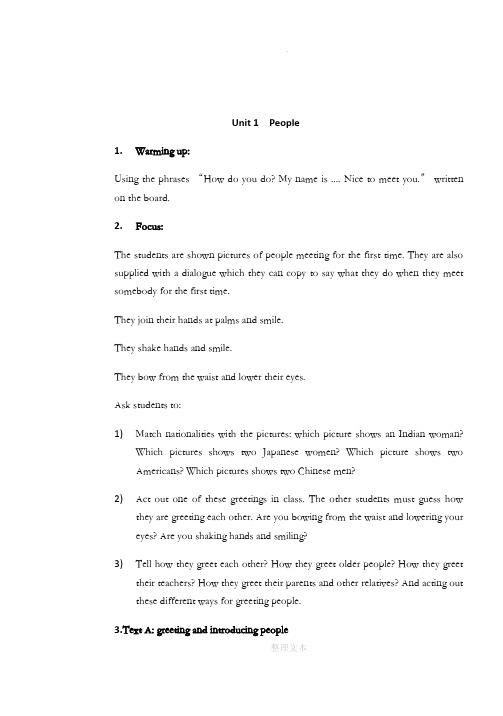
Unit 1 People1.Warming up:Using the phrases “How do you do? My name is .... Nice to meet you.” written on the board.2.Focus:The students are shown pictures of people meeting for the first time. They are also supplied with a dialogue which they can copy to say what they do when they meet somebody for the first time.They join their hands at palms and smile.They shake hands and smile.They bow from the waist and lower their eyes.Ask students to:1)Match nationalities with the pictures: which picture shows an Indian woman?Which pictures shows two Japanese women? Which picture shows two Americans? Which pictures shows two Chinese men?2)Act out one of these greetings in class. The other students must guess howthey are greeting each other. Are you bowing from the waist and lowering your eyes? Are you shaking hands and smiling?3)Tell how they greet each other? How they greet older people? How they greettheir teachers? How they greet their parents and other relatives? And acting out these different ways for greeting people.3.Text A: greeting and introducing people整理文本1)New words reading2)Ask students what they can see in the pictures, how old they think the peopleare, what kind of occasion it could be and if they have a barbecue at home and what they barbecue.3)Ask students to read out the text loud paragraph by paragraph. Collect anywords which students have difficulty pronouncing. Writing these words on the board. Make a list on the board. Then repeat the words.4)Ask students the following questions:How to greet an older person when you meet him for the first time?Do you shake hands with an older person?Do you smile at an older person?How do you introduce yourself to an older person?What do you say to a younger person?How do you introduce somebody else to a younger person?What do you say to somebody you already know?How do you answer a younger person you know who greets you first?5)Pair work as Kate Miller and Sung Ling starting from line 17.6)Page 5-1: read out the sentences and then pair them.7)Page 5-2: check the meaning of the words before doing.4.Background information:整理文本1)student exchange: increase student’s understanding and tolerance of other cultures, as well as improving their language skills and broaden their social horizon.2)Barbecue: an outdoor meal, usually a form of social gathering at which meats, fish, or fowl, along with vegetables, are roasted over a wood or charcoal fire.5.words and expressions:1)exchange partner2)BowThey bowed low to the chairman.He turned and bowed to his boss.Bow and arrowsHe took bow on stage to audience.3)Next-door neighbor4)LimpLimp handshakeShe let her whole body go limp.Mary had twisted her ankle and was limping. 一瘸一拐5)Friend--friendly unfriend--unfriendly--unfriendliness6)Informal--informally--informality7)Short period整理文本8)Formal--formally--formality9)Had better do10)Informal formal natural personal professional additional educational musical actual official regional industrial international medical traditional cultural practicalSpeaking:整理文本Page7 listening 1:Before playing the recording get students to read the sentences 1 to 6, first quietly to themselves, then aloud. Make sure that everybody has understood the sentences.Now play the recording and get students to do the exercise. Be prepared to play the recording as often as the students need it.Patrick: good morning. Excuse me, but are you Ms Susan Garner from Chicago, please?整理文本Susan: that’s right.Patrick: how do you do, Ms Garner? I’m Patrich Choy. It’s nice to meet you. I’ve come to take you to your hotel.Susan: how do yo u do, Mr Choy. It’s nice to meet you, too. Look, may i introduce you to one of my colleagues? This is tony Hunter. Tony, this is Patrick Choy. He’s come to take us to our hotel.Tony: Fine. How do you do, Mr Choy? It’s a pleasure to meet you.Patrick: How do you do, Mr Hunter. Welcome to Hongkong.Tony: Thank you. I’ve heard so many good things about Hongkong that it’s wonderful to be here.Patrick: that’s nice to hear. Now, could you come this way, please? The car’s just outside the building. It’s not far.Ask students to read out the sentences and say whether they are true or false. Grammar check: nouns整理文本。
高级职业英语第一册第一单元unit1

Assignments
The learning environment
The ‘lesson’ is the usual teaching mode. Time spent in class takes up most of students’ learning
time.
Lectures, tutorials , seminars and lab sessions are features of university teaching. These are conducted face-to-face and, increasingly, online.
Students may use the Internet and newspapers for research.
University lecturers usually give out long reading lists. They may point out what is essential to read from the list and what is desirable to read but not crucial.
We rely on you to do the work. 我们依靠你们去做这件事。 You can rely on my watch keeping time. 你可以放心,我的表走得很准。
3. exclusively: adv. not including others; only专有地,唯一地 For example:
高职英语第一册unit one教案
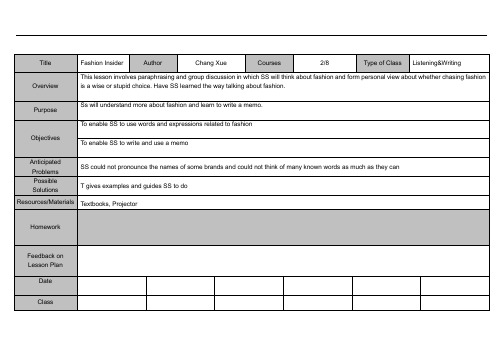
Problems
SS could not pronounce the names of some brands and could not think of many known words as much as they can
Possible
Solutions
T gives examples and guides SS to do
Listen and finish task 1&2.
Check andcorrectanswers.
Discuss and understand the example, then, write a memo independently according to the direction.
Share your views about fashion with the whole class.
T gives assignment of next lesson that ss think about some famous brands.
SS look up the unknown words in the dictionary.
Try to understand the Memo in Task 2 on page 9.
Resources/Materials
Textbooks, Projector
Homework
Feedback on
Lesson Plan
Date
Class
STAGE OF
LESSON
TEACHER PARTICIPATION
STUDENT PARTICIPATION
Procedures
高职国际英语1 unit 1教学文案

高职国际英语1u n i t1Unit 1 People1.Warming up:Using the phrases “How do you do? My name is .... Nice to meet you.”written on the board.2.Focus:The students are shown pictures of people meeting for the first time. They are also supplied with a dialogue which they can copy to say what they do when they meet somebody for the first time.They join their hands at palms and smile.They shake hands and smile.They bow from the waist and lower their eyes.Ask students to:1)Match nationalities with the pictures: which picture shows anIndian woman? Which pictures shows two Japanese women?Which picture shows two Americans? Which pictures shows twoChinese men?2)Act out one of these greetings in class. The other students mustguess how they are greeting each other. Are you bowing from the waist and lowering your eyes? Are you shaking hands and smiling?3)Tell how they greet each other? How they greet older people? Howthey greet their teachers? How they greet their parents and otherrelatives? And acting out these different ways for greeting people.3.Text A: greeting and introducing people1)New words reading2)Ask students what they can see in the pictures, how old they thinkthe people are, what kind of occasion it could be and if they have a barbecue at home and what they barbecue.3)Ask students to read out the text loud paragraph by paragraph.Collect any words which students have difficulty pronouncing.Writing these words on the board. Make a list on the board. Thenrepeat the words.4)Ask students the following questions:How to greet an older person when you meet him for the first time?精品资料Do you shake hands with an older person?Do you smile at an older person?How do you introduce yourself to an older person?What do you say to a younger person?How do you introduce somebody else to a younger person?What do you say to somebody you already know?How do you answer a younger person you know who greets you first?5)Pair work as Kate Miller and Sung Ling starting from line 17.6)Page 5-1: read out the sentences and then pair them.7)Page 5-2: check the meaning of the words before doing.4.Background information:1)student exchange: increase student’s understanding and tolerance of other cultures, as well as improving their language skills and broaden their social horizon.2)Barbecue: an outdoor meal, usually a form of social gathering at which meats, fish, or fowl, along with vegetables, are roasted over a wood or charcoal fire.5.words and expressions:1)exchange partner2)BowThey bowed low to the chairman.He turned and bowed to his boss.Bow and arrowsHe took bow on stage to audience.3)Next-door neighbor4)LimpLimp handshakeShe let her whole body go limp.Mary had twisted her ankle and was limping. 一瘸一拐5)Friend--friendly unfriend--unfriendly--unfriendliness6)Informal--informally--informality7)Short period精品资料8)Formal--formally--formality9)Had better do10)Informal formal natural personal professional additional educational musical actual official regional industrial international medical traditional cultural practical精品资料Page7 listening 1:Before playing the recording get students to read the sentences 1 to 6, first quietly to themselves, then aloud. Make sure that everybody has understood the sentences.Now play the recording and get students to do the exercise. Be prepared to play the recording as often as the students need it. Patrick: good morning. Excuse me, but are you Ms Susan Garner from Chicago, please?Susan: that’s right.Patrick: how do you do, Ms Garner? I’m Patrich Choy. It’s nice to meet you. I’ve come to take you to your hotel.Susan: how do you do, Mr Choy. It’s nice to meet you, too. Look, may i introduce you to one of my colleagues? This is tony Hunter. Tony, this is Patrick Choy. He’s come to take us to our hotel. Tony: Fine. How do you do, Mr Choy? It’s a pleasure to meet you. Patrick: How do you do, Mr Hunter. Welcome to Hongkong. Tony: Thank you. I’ve heard so many good things about Hongkong精品资料that it’s wonderful to be here.Patrick: that’s nice to hear. Now, could you come this way, please? The car’s just outside the building. It’s not far.Ask students to read out the sentences and say whether they are true or false.精品资料Text B: Blind Date1.Background information:1)Blind date: it usually occurs when the two people previously notknowing each other are going out on a date set up by another person who knows both people. Today, most blind dates are n’t totally blind per se, thanks to online social sites such as Facebook and MySpace, where many people have photographs of themselves that are easily accessible by others.2)Geocaching地理寻宝游戏: is a high tech version of hide and seekand an outdoor recreational activity, in which the participants explore the outdoors in search of hidden “treasure” and adventure by using a GPS receiver or mobile device and other navigational techniques.2.Words and expressions:1)Internet dating site2)I could not believe my eyes.3)She began modelling in Paris aged 15.4)Glamour--glamorous5)Suit--suitable6)All the girls fancied him.Linda took quite a fancy to him.What do you fancy doing?I just fancied a drink.7)tongue-tied8) A generous glass of wine一大杯酒; generosity 大量充足精品资料9)Tip the waiter a dollar10)Striped tie条纹领带11)Tie up your shoelaceI tied a knot in the rope.12)i can’t stand.13)Ignore--ignorant--ignorance14)Be in no mood for.../to do...没心情做某事Be in the mood for../to do...有心情做某事Be in a mood情绪不好15)misery--miserable--miserably16)Regret--regrettable--regrettably17)Straight away 马上18)Hopefully 但愿19)Strike up a conversation with sb.搭讪攀谈 strick--struck20)Be in conversation with sb. 正在谈话21)Make conversation 搭话找话说说应酬话精品资料精品资料。
高教社高职高专《英语》Book1-Unit1PPT课件
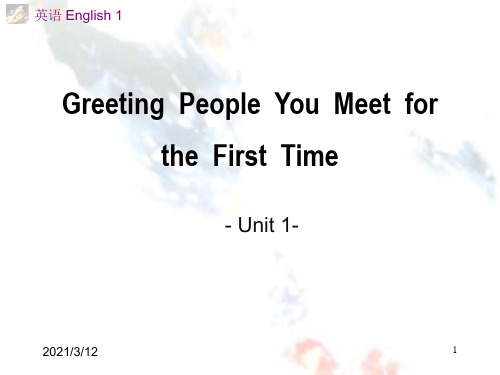
2021/3/12
12
英语 English 1
Before Reading Detailed Reading After Reading Quit
6
英语 English 1
Before Reading Detailed Reading After Reading Quit
2021/3/12
Li: Lizzy: Li:
Hi, you must be Lizzy. I'm Li Hong from the Technical School.
Oh, how do you do, Li Hong? Thank you for coming to meet me.
2021/3/12
1. Check your understanding 2. Build up your language stock 3. Pick Up Your Grammar 4. Merry Learning
4
英语 English 1
1. Greeting difference between Chinese and English (Part 1)
Lizzy: Li:
Yeah, quite good. But I am a little tired . It’s a long journey , you know.
Yes, let’s go back to the Guest House of our school. Everything is ready for you there.
1. Dialogue A 2. Dialogue B 3. Passage A
Before Reading Detailed Reading After Reading Quit
- 1、下载文档前请自行甄别文档内容的完整性,平台不提供额外的编辑、内容补充、找答案等附加服务。
- 2、"仅部分预览"的文档,不可在线预览部分如存在完整性等问题,可反馈申请退款(可完整预览的文档不适用该条件!)。
- 3、如文档侵犯您的权益,请联系客服反馈,我们会尽快为您处理(人工客服工作时间:9:00-18:30)。
Unit 1 - People
People and issues – Text (A)
Text study
Background information Words and expressionsFra bibliotekText
Looking at the text
Working with words Speaking
Listening
Grammar
Nouns:
details
Project: A leaflet for foreign visitors on
Countable and uncountable nouns Making uncountable nouns countable Using irregular plural forms
Looking at the text Working with words
Book 1
Unit 1 - People
Brief summary of the unit
Topics
Greeting people for the first time Greeting people you already know Introducing yourself and others Saying goodbye Shaking hands Forms of address
Unit 1 - People
What can you see in the photos?
An Indian woman Two Chinese men Two Japanese women Two Americans
is are
bowing from the waist. joining her palms together and smiling. shaking hands and smiling.
Listening 1 Listening 2 Listening 3 Listening 4
Book 1
Unit 1 - People
Personal view – Text (B)
Text study
Background information Words and expressions Text
Book 1
17. Where can you find a picture of people doing Tai Chi? On page 107, unit 7. ________________________________________ 18. Where can you find a sign of somebody sleeping? On page 127, unit 8. ________________________________________ 19. Where can you find a form to fill out? On page 14, unit 1. ________________________________________ 20. Which sport can you see on the page with sky diving, abseiling and street running? Bungee jumping. Page 85, unit 6. ________________________________________ 21. What is the third photo next to Sydney and Shanghai? New York. Page 8, unit 1. ________________________________________ 22. Who won the French Open in 2011? Li Na. Page 92, unit 6. ________________________________________
Skills
Greeting people for the first time Introducing yourself and others
Saying hello and goodbye
Spelling out names Saying where you’re from
Writing: Filling out forms with personal
Chinese customs
Book 1
Unit 1 - People
Warming up
Self-introduction
teacher to the class
student to his/her neighbor
Useful Expressions
How do you do? My name is XXX. Nice to meet you.
13. How many children does Nadya Suleman have? 14. Page 50, unit 4. ________________________________________
14. What was the name of the boy who committed suicide when his computer broke down? Jason. Page 73, unit 5. ________________________________________ 15. What is the most popular hobby? Cooking. Page 83, unit 6. ________________________________________
7. What is the name of the girl who was bullied to death? Phoebe Prince, page 77, unit 5. ________________________________________ 8. Where can you find a text about a dental appointment? On page 55, unit 4. ________________________________________ 9. Where can you find a picture of a T-shirt with “excuses” on it? On page 60, unit 4. ________________________________________ 10. What is the Chinese size for a European size 42? It is “S”. On page 39, unit 3. ________________________________________
Book 1
10. Where can you see a graph showing different entertainment media? Page 69, unit 5. ________________________________________ 11. Where is eBay’s head office? San Jose, On page 43, unit 3. ________________________________________ 12. Where can you find a picture of eggs? On page 99, unit 7. ________________________________________
Book 1 Focus
Unit 1 - People
What do people do in different cultures?
China India it is In Japan usual to the West parts of Asia join the hands with palms together and smile. bow from the waist and lower the eyes. shake hands and smile.
Book 1
Unit 1 - People
Brief summary of the unit Warming up Focus People and issues – Text (A) Personal view – Text (B)
Writing
Grammar check
Project
Quiz
Book 1
two Americans? Which picture shows
two Chinese men?
Book 1 Focus
Unit 1 - People
Use the dialogue guide to answer the questions.
What do you do when you meet somebody for the first time?
Book 1 Focus
Unit 1 - People
Match the nationalities.
Which picture shows
an Indian woman?
Which picture shows two Japanese women?
Which picture shows
Book 1
Book Rally
Directions: Skim through the book and find the answers to these questions. 1. What team sport can you see in unit 5? Basketball, page 66. ________________________________________ 2. In which unit and on what page can you find out what the speed limit is in Britain? On page 30, unit 2. ________________________________________ 3. Where can you find a picture of a shopping mall? On page 33, unit 3. ________________________________________ 4. Where can you find a picture of Chinatown? On page 24, unit 2, and on page 105, unit 7. ________________________________________
